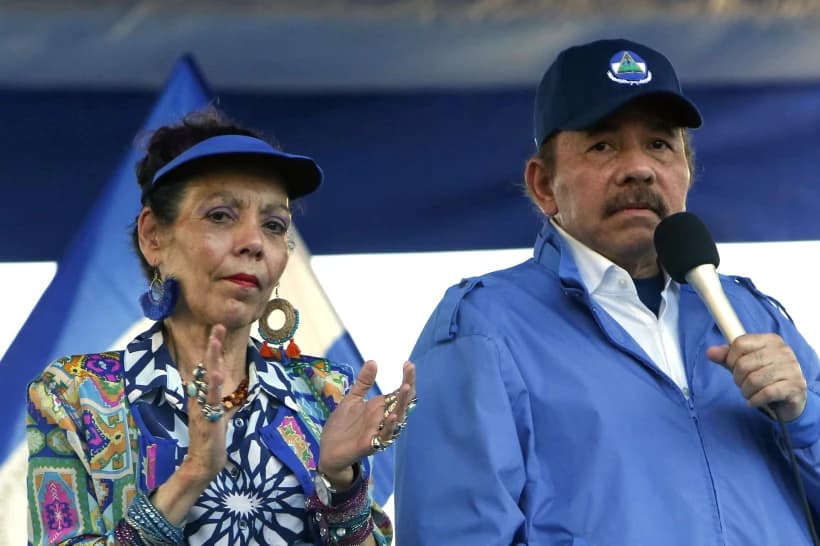SÃO PAULO, Brazil – A broad constitutional reform promoted by the Sandinista leader Daniel Ortega and his wife, Vice President Rosario Murillo, will probably increase the political persecution of the Catholic Church – as well as other Christian churches and denominations – in Nicaragua, according to analysts.
Among 200 articles, more than 140 will be changed, while 37 will be canceled. The Congress has already approved the new Constitution, but it has to vote for it again, something that will probably happen only in 2025.
The new Constitution further concentrates the power in the hands of Ortega and Murillo, from now on considered to be “co-presidents.” All State branches will remain under control of the Executive. The Armed Forces and the police, also directly subordinated to the ruling couple, will receive the official complementation of the so-called Voluntary Police, mostly formed by citizens. Such a force was key to repressing the demonstrators that opposed Ortega’s reform in 2018 and took to the streets.
Changes also allow a stronger control over the press and over citizens, who now can be more easily stripped of their Nicaraguan nationality if they’re considered traitors. As a matter of fact, many political dissidents sent to exile by the regime have already lost their citizenship.
When it comes to religion, a number of dispositions weaken the churches operating in Nicaragua. That’s the case of article 14, which establishes that “under the protection of religion, no person or organization can carry out activities that threaten public order.” It also determines that “the religious organizations must keep free from all foreign control.”
That article was seen by many opponents of Ortega’s regime as a move to dominate the Christian churches located in Nicaragua, including the Catholic Church.
“That modification eliminates the spirit of what we know as religion. Religions are not limited to specific territories. They don’t see barriers,” Yader Valdivia told Crux.
Valdivia is coordinator of documentation and research at the non-governmental organization Nicarágua Nunca Más, which gathers human rights activists exiled in Costa Rica.
One of the most obvious examples of what the regime may consider as “foreign control” is the relation between the Vatican and the Catholic Church in Nicaragua. But other Christian denominations, especially those founded and established in other countries, may be impacted.
“In the State that is being created by the new Constitution, only the Ortega-Murillo couple will be able to control religion in the country,” Valdivia said.
Article 69 mentions that the public or private manifestation of religious creeds must be carried out in accordance with the fundamental principles established by the Constitution. Article 120 determines that private schools can educate the children in matters of faith, but also according to the principles of the Constitution.
“And which are such principles? Those principles are the ones established by the new Constitution, they’re the revolutionary principles,” Valdivia said, adding that it is a direct aggression against all religions to subordinate their creeds to Sandinismo.
The Catholic Church has been continuously attacked by Ortega’s regime since the 2018 mass protests. According to Nicarágua Nunca Más, the government has arrested at least 74 religious people between 2018-2024. Most of them are priests. Sixty-three of them were released and sent to exile. Thirty-five lost their nationality.
Three Catholic bishops have been sent to exile by now. The most recent of them was Bishop Carlos Enrique Herrera of Jinotega, who heads the Bishops’ Conference. After criticizing a noisy activity promoted by the local city government during the Holy Mass on Nov. 10, Herrera was taken to Managua’s airport and put into a flight to Guatemala. The mayor that was criticized by the bishop, named Leonidas Centeno, is one of the most important ones in Nicaragua, due to his ties with the ruling couple.
In Guatemala, Herrera was welcomed by his Congregation’s brothers, the Franciscan friars, according to Spanish newspaper El Pais.
More recently, the regime also promoted a broad attack on Evangelical churches, canceling the legal status of hundreds of them with very weak motivations of bureaucratic nature.
According to Yader Valdivia, Nicarágua Nunca Más is not mentioning the Constitutional changes as a reform, given that most of the original articles are gone.
“The way how the State is run is based on the Constitution. Ortega and Murillo are completely changing it, so what they’re doing is really a coup d’état,” Valdivia said.













